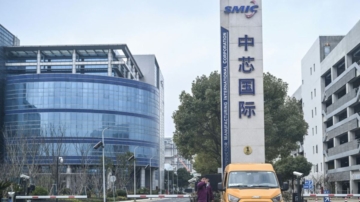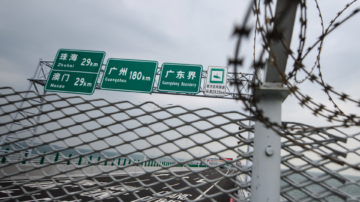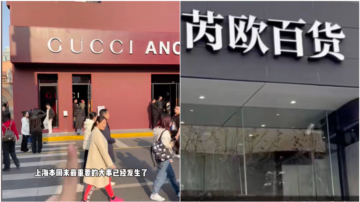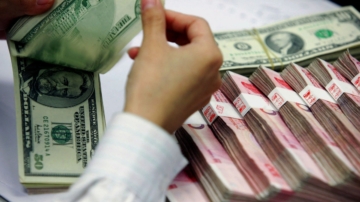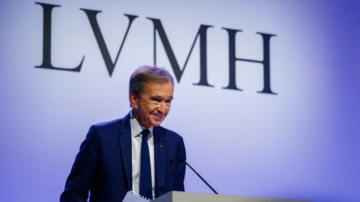【新唐人2013年10月03日訊】近日中共國務院參事、中央財經大學稅務學院副院長劉桓在一次講座上透露,徵收遺產稅可能被寫入十八大三中全會文件草稿。專家指出,徵收遺產稅的前提是財產申報制度,中國由於大量官員存在灰色收入和隱匿的財產,徵收遺產稅將遭遇強大阻力。並且,在中國現行的土地公有製下,房產只有70年使用權而無所有權,從法理上來說跟遺產稅也是互相矛盾的。
專業從事稅務工作的北京註冊會計師杜延林認為,遺產稅徵收是有必要的,因為遺產稅的目的是向富人徵稅,縮小貧富差距。但是中國目前企業所得稅和個人所得稅所佔比例小,依靠的主要是由消費者和普通平民來繳納的間接稅。
杜延林還指出,遺產稅的徵收需要一個環境和一些條件,當前中國可能不具備。比如一個最基本的條件是,要有一個財產申報制度。
北京註冊會計師杜延林:「我們一直在呼籲官員公開他的財產,進行財產申報,這個是一個很大的阻力實現不了。如果官員腐敗不去申報財產的話,那麼這些富人的財產是無法從信息中去得到財產。只能有些最明顯的比如說房產之類的去徵收,但是即使房產,現在的房產登記制度也不能完全準確的把我們個人房產的正確信 息登記出來。比如房叔,房姐的出現。」
早在2004年9月,中共財政部就出臺《中華人民共和國遺產稅暫行條例(草案)》,並在2010年進行了修訂。但是遭遇各方阻力,時至今日也未付諸實施。
北京天則經濟研究所副所長馮興元指出,推行遺產稅將涉及到腐敗程度的曝光,首先會遭到高級官員的反對。
北京天則經濟研究所副所長馮興元:「短期內可能還是不行。因為阻力會非常大。遺產稅的基礎還是你財產要分割清楚。但是如果財產要分割清楚的背後,實際上黨政幹部的很多財產都要有登記,無論公開不公開,都要登記。這個登記的話,會遭到政府官員高級官員,首先會反對。這裡面涉及到個人利益,包括他可能跟腐敗程度的曝光,都會有掛鉤。」
所謂遺產稅指的是完全屬於自己的東西交給別人。中共聲稱,徵收遺產稅是要和國際接軌,但是,中共製定了土地國家所有製,房子的產權只有70年的使用權,沒有所有權。杜延林指出,中共製定的大量法律,都存在法理上的矛盾之處。
杜延林:「你想想中國的法律體系,本身就不是一個真正的法律。它是一個工具,政府的工具。因為從嚴格法律上說,各種法律的法規的法理必須首先是清楚的,產權是很清楚的。但中國的法律本身是一個不完整的法律,一個不徹底的法律。它只是政府用來做事情的工具,所以說它就存在大量的矛盾。」
杜延林認為,這將會導致大量問題出現。他舉例說,到50年以後,房子的使用年限還剩很少的幾年,子女面臨的問題是,繼承房產還是不繼承?如果說繼承的話,那麼會繳大量的遺產稅。並且,怎麼去評估房產剩餘的價值?
杜延林表示,要解決這些問題,需要對整個產權制度進行改革。但他相信,當局是不可能將土地使用權變成永久所有權的。
杜延林:「所以如果失去了這兩個絕對支配權,那麼它的土地財政制度就崩潰,那麼中共當局的經濟支柱,地方政府財政的支柱就是土地財政,就是靠房價,賣土地來取得。如果它沒有70年的循環,那麼到70年以後,土地使用權失去以後,它就無法控制土地經濟了。所以這個可能性不大。」
關於徵收遺產稅產生的這些矛盾和問題,歸根結蒂,都是所謂的公有製造成的。中共的所謂農村集體所有和全民所有的概念,在外界看來都是很模糊又很荒唐的。產權必須細分到每個人,法理上才能清楚這個東西歸誰。專家一致認為,必須土地私有化,才能解決遺產稅的法理困境。
採訪編輯/秦雪 後製/陳建銘
China's Inheritance Tax Contradicts State-Ownership of Land
Liu Huan, Cabinet advisor and deputy director at Central
University of Finance and Economics, revealed that
inheritance tax was written into a draft document for the 3rd
Plenary Session of the 18th Chinese Communist Party (CCP).
Experts say that the premise of inheritance tax
is the property declaration system.
Many officials received gray income and
possessed hidden properties,
thus, levying inheritance tax will face great opposition.
Under current laws, people can only have a 70-year leasehold
on real estate, which contradicts the inheritance tax law.
Du Yanlin, a professional accountant in Beijing,
says it's necessary to launch an inheritance tax.
It purpose is to tax the rich, narrowing the wealth gap.
Currently, in China, the company and individual income tax
only take a small percentage.
The regime relies on indirect taxes
from consumers and citizens.
Du Yanlin says that levying an inheritance tax needs
an environment and appropriate conditions, neither is available.
For example, a basic condition
is the need for a property declaration system.
Du Yanlin:"We've repeatedly urged the disclosure of
officials assets, they need to declare their properties.
However, it is hard to carry out.
If corrupt officials don't declare their assets, we can't obtain
the information on rich people's property.
The only way to collect the tax is from registered properties.
However, the current property registration system can't
accurately reflect the individual information, with phenomena
such as 'Uncle Housing' or 'Sister Housing' appearing."
Since September 2004, the Ministry of Finance had written
a draft code for the inheritance tax.
It was revised in 2010.
However, it faces different obstacles from all sides,
and it still hasn't yet been implemented.
Feng Xingyuan, Beijing Unirule Institute of Economics
deputy director, says that carrying out inheritance tax will
involved the exposure of corruption.
It will first be resisted by senior officials.
Feng Xingyuan:"It's unlikely to be implemented anytime soon.
Because there many huge resistances.
Inheritance tax is based on clearly registered property.
To achieve this, many cadres
need to register their properties.
Whether openly declared or not,
their assets must be registered.
Thus, regime officials and senior officials will be first to resist.
As it relates to their vested interests,
their corruption could be exposed."
China's inheritance tax refers to
giving your own property to others.
The CCP claims that the inheritance tax
is to accord with international standards.
However, the CCP owns the land.
People can only have a 70-year leasehold,
but they never own it.
Du Yanlin says many laws
formulated by the CCP are contradictory.
Du Yanlin:"You think about it, China's law system itself
is not [based on] real law.
It is a tool, the regime's tool.
From legal point of view, each regulation must be clearly
indicated, the ownership of the property must be clear.
However, China's law itself is incomplete, or not thorough.
It is just a tool using by the regime,
thus it has many contradictions."
Du says that this will cause many problems.
For example, after 50 years, few years remain on the leasehold.
Children will face questions on whether to take the property.
If they take it, they have to pay many taxes.
In addition, how can the property's remaining value be assessed?
Du Yanlin says reforming the entire system of property
rights can resolve these problems.
But he says that the regime is unlikely to change
land access to permanent ownership.
Du Yanlin: "If the authorities lose the absolute right
of land control, the land finance system will collapse.
Then the financial support for central and local regime
will rely on housing prices and selling land to obtain finances.
If there is no 70 year cycle, the authorities will lose the
use right to the land and cannot control the economy of the
land after 70 years. So it is impossible.
Ultimately, estate taxes incurred on these contradictions and
problems are the result of the so-called public ownership.
CCP's so-called"rural collective ownership"and the "owned
by the whole people"concepts are very vague and absurd.
Property right must clearly indicate each individual person,
only then can the law judge who the property belongs to.
Experts say that only the privatization of land can
resolve the estate duty problem.
專業從事稅務工作的北京註冊會計師杜延林認為,遺產稅徵收是有必要的,因為遺產稅的目的是向富人徵稅,縮小貧富差距。但是中國目前企業所得稅和個人所得稅所佔比例小,依靠的主要是由消費者和普通平民來繳納的間接稅。
杜延林還指出,遺產稅的徵收需要一個環境和一些條件,當前中國可能不具備。比如一個最基本的條件是,要有一個財產申報制度。
北京註冊會計師杜延林:「我們一直在呼籲官員公開他的財產,進行財產申報,這個是一個很大的阻力實現不了。如果官員腐敗不去申報財產的話,那麼這些富人的財產是無法從信息中去得到財產。只能有些最明顯的比如說房產之類的去徵收,但是即使房產,現在的房產登記制度也不能完全準確的把我們個人房產的正確信 息登記出來。比如房叔,房姐的出現。」
早在2004年9月,中共財政部就出臺《中華人民共和國遺產稅暫行條例(草案)》,並在2010年進行了修訂。但是遭遇各方阻力,時至今日也未付諸實施。
北京天則經濟研究所副所長馮興元指出,推行遺產稅將涉及到腐敗程度的曝光,首先會遭到高級官員的反對。
北京天則經濟研究所副所長馮興元:「短期內可能還是不行。因為阻力會非常大。遺產稅的基礎還是你財產要分割清楚。但是如果財產要分割清楚的背後,實際上黨政幹部的很多財產都要有登記,無論公開不公開,都要登記。這個登記的話,會遭到政府官員高級官員,首先會反對。這裡面涉及到個人利益,包括他可能跟腐敗程度的曝光,都會有掛鉤。」
所謂遺產稅指的是完全屬於自己的東西交給別人。中共聲稱,徵收遺產稅是要和國際接軌,但是,中共製定了土地國家所有製,房子的產權只有70年的使用權,沒有所有權。杜延林指出,中共製定的大量法律,都存在法理上的矛盾之處。
杜延林:「你想想中國的法律體系,本身就不是一個真正的法律。它是一個工具,政府的工具。因為從嚴格法律上說,各種法律的法規的法理必須首先是清楚的,產權是很清楚的。但中國的法律本身是一個不完整的法律,一個不徹底的法律。它只是政府用來做事情的工具,所以說它就存在大量的矛盾。」
杜延林認為,這將會導致大量問題出現。他舉例說,到50年以後,房子的使用年限還剩很少的幾年,子女面臨的問題是,繼承房產還是不繼承?如果說繼承的話,那麼會繳大量的遺產稅。並且,怎麼去評估房產剩餘的價值?
杜延林表示,要解決這些問題,需要對整個產權制度進行改革。但他相信,當局是不可能將土地使用權變成永久所有權的。
杜延林:「所以如果失去了這兩個絕對支配權,那麼它的土地財政制度就崩潰,那麼中共當局的經濟支柱,地方政府財政的支柱就是土地財政,就是靠房價,賣土地來取得。如果它沒有70年的循環,那麼到70年以後,土地使用權失去以後,它就無法控制土地經濟了。所以這個可能性不大。」
關於徵收遺產稅產生的這些矛盾和問題,歸根結蒂,都是所謂的公有製造成的。中共的所謂農村集體所有和全民所有的概念,在外界看來都是很模糊又很荒唐的。產權必須細分到每個人,法理上才能清楚這個東西歸誰。專家一致認為,必須土地私有化,才能解決遺產稅的法理困境。
採訪編輯/秦雪 後製/陳建銘
China's Inheritance Tax Contradicts State-Ownership of Land
Liu Huan, Cabinet advisor and deputy director at Central
University of Finance and Economics, revealed that
inheritance tax was written into a draft document for the 3rd
Plenary Session of the 18th Chinese Communist Party (CCP).
Experts say that the premise of inheritance tax
is the property declaration system.
Many officials received gray income and
possessed hidden properties,
thus, levying inheritance tax will face great opposition.
Under current laws, people can only have a 70-year leasehold
on real estate, which contradicts the inheritance tax law.
Du Yanlin, a professional accountant in Beijing,
says it's necessary to launch an inheritance tax.
It purpose is to tax the rich, narrowing the wealth gap.
Currently, in China, the company and individual income tax
only take a small percentage.
The regime relies on indirect taxes
from consumers and citizens.
Du Yanlin says that levying an inheritance tax needs
an environment and appropriate conditions, neither is available.
For example, a basic condition
is the need for a property declaration system.
Du Yanlin:"We've repeatedly urged the disclosure of
officials assets, they need to declare their properties.
However, it is hard to carry out.
If corrupt officials don't declare their assets, we can't obtain
the information on rich people's property.
The only way to collect the tax is from registered properties.
However, the current property registration system can't
accurately reflect the individual information, with phenomena
such as 'Uncle Housing' or 'Sister Housing' appearing."
Since September 2004, the Ministry of Finance had written
a draft code for the inheritance tax.
It was revised in 2010.
However, it faces different obstacles from all sides,
and it still hasn't yet been implemented.
Feng Xingyuan, Beijing Unirule Institute of Economics
deputy director, says that carrying out inheritance tax will
involved the exposure of corruption.
It will first be resisted by senior officials.
Feng Xingyuan:"It's unlikely to be implemented anytime soon.
Because there many huge resistances.
Inheritance tax is based on clearly registered property.
To achieve this, many cadres
need to register their properties.
Whether openly declared or not,
their assets must be registered.
Thus, regime officials and senior officials will be first to resist.
As it relates to their vested interests,
their corruption could be exposed."
China's inheritance tax refers to
giving your own property to others.
The CCP claims that the inheritance tax
is to accord with international standards.
However, the CCP owns the land.
People can only have a 70-year leasehold,
but they never own it.
Du Yanlin says many laws
formulated by the CCP are contradictory.
Du Yanlin:"You think about it, China's law system itself
is not [based on] real law.
It is a tool, the regime's tool.
From legal point of view, each regulation must be clearly
indicated, the ownership of the property must be clear.
However, China's law itself is incomplete, or not thorough.
It is just a tool using by the regime,
thus it has many contradictions."
Du says that this will cause many problems.
For example, after 50 years, few years remain on the leasehold.
Children will face questions on whether to take the property.
If they take it, they have to pay many taxes.
In addition, how can the property's remaining value be assessed?
Du Yanlin says reforming the entire system of property
rights can resolve these problems.
But he says that the regime is unlikely to change
land access to permanent ownership.
Du Yanlin: "If the authorities lose the absolute right
of land control, the land finance system will collapse.
Then the financial support for central and local regime
will rely on housing prices and selling land to obtain finances.
If there is no 70 year cycle, the authorities will lose the
use right to the land and cannot control the economy of the
land after 70 years. So it is impossible.
Ultimately, estate taxes incurred on these contradictions and
problems are the result of the so-called public ownership.
CCP's so-called"rural collective ownership"and the "owned
by the whole people"concepts are very vague and absurd.
Property right must clearly indicate each individual person,
only then can the law judge who the property belongs to.
Experts say that only the privatization of land can
resolve the estate duty problem.

